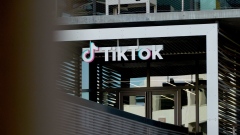Jun 16, 2024
Scale of Sunak’s Challenge Laid Bare by Disastrous UK Polling
, Bloomberg News

(Bloomberg) -- Less than three weeks before the UK’s general election, Prime Minister Rishi Sunak was beset by a series of damaging opinion polls over the weekend that suggest he has little chance of turning his Conservative Party’s fortunes around before the vote on July 4.
After Britain’s two main parties published their election manifestos last week, Keir Starmer’s Labour opposition extended its lead over the Tories in polls by Opinium for the Observer and Savanta for the Sunday Telegraph.
More damagingly for Sunak’s party, seat-by-seat analysis by Survation found Labour to be on course to a large majority, with the Conservatives winning 72 of the 650 seats in the House of Commons, compared with 365 at the last election in 2019. Nigel Farage’s Reform UK, blamed by many Tories for siphoning off right-wing votes, was forecast to win seven.
In a sign of concern among senior Conservatives, Transport Secretary Mark Harper on Sunday told BBC TV that defecting voters risked giving Starmer an unassailable majority.
“It’s very clear if you’re somebody who voted for us in 2019 and you want lower taxes and you want to control migration, if you vote for anybody else other than the Conservatives you’re going to get a Labour government with a large majority and a blank check,” Harper said.
Robert Jenrick, a former Tory minister and one-time close ally of Sunak, wrote in the Sunday Telegraph that the UK risks “sleepwalking into a very dangerous future,” before pulling apart his own party’s record in government and saying he understood why Conservatives are being drawn to Reform.
“Not only do I understand their frustrations, I share many of them,” Jenrick wrote. “The tax burden is too high, criminal justice system too soft and public services too inefficient. My disagreements with the government on immigration policy meant I resigned from the Cabinet.”
Savanta’s poll put Reform UK on 13%, its highest rating yet by the pollster, while Opinium put the party up two percentage points on 14%, also a record.
Bloomberg’s poll of polls on Friday also had Reform at an all-time high — after a YouGov survey last week put the insurgent party ahead of the Tories for the first time, prompting Farage to declare Reform “the opposition to Labour.”
Reform on Monday will publish its election manifesto, which it’s calling a “contract with the people.” And while Farage said last week that the Conservative Party brand is “done,” he’s also gunning for Labour, as shown by his choice of Merthyr Tydfil in Wales — a Labour seat — for the manifesto launch.
“If you want a picture of what the whole country will be like with a Starmer government and a feeble Conservative opposition, come to Wales,” Farage said in a statement Sunday.
“Schools are worse than in England, NHS waiting lists are longer than in England, Covid restrictions were even tighter than in England and now Welsh motorists are being soaked by literally hundreds of speed cameras,” he said.
The Scottish National Party is also set to publish its electoral promises this week. Its new leader, John Swinney, sought in a statement late on Sunday to portray Labour as joining the Tories in “offering only cuts, austerity and stagnation.”
In other campaign news:
- The Tories said Labour’s plan to end new licenses for oil and gas exploration would create a £4.5 billion ($5.7 billion) “budget black hole in lost tax revenues,” an accusation Labour dismissed as “desperate nonsense”
- Labour on Monday plans to pledge to hold a global investment summit in its first 100 days in office to show that “Britain is open for business”
- Longtime Tory donor Spencer McCarthy, chief executive of Churchill Retirement Living, said he might switch to Labour because he was impressed by Starmer’s manifesto, the Telegraph reported
- Labour’s shadow health secretary, Wes Streeting, urged junior doctors to cancel a planned strike in the run-up to the election and said he’d phone them for talks on day one of a Labour government
- Labour’s shadow chancellor, Rachel Reeves, will reiterate plans to invest £7.3 billion in a new National Wealth Fund, and promise to create 650,000 good jobs, according to a party statement
- Reeves told the Financial Times she wants to see closer alignment with the European Union on issues such as chemical regulations and mutual recognition of professional qualifications that would benefit the City of London.
Survation’s so-called Multilevel Regression and Post-stratification poll put Labour on 456 seats, the Liberal Democrats on 56, and the SNP on 37, a drop from 48 in 2019. The modeling is based on more than 42,000 interviews conducted between the May 31 and June 13.
Savanta gave Labour a 25-point advantage and said potential “electoral extinction” awaited the Tories. Opinium has Labour leading by 17 points.
©2024 Bloomberg L.P.







